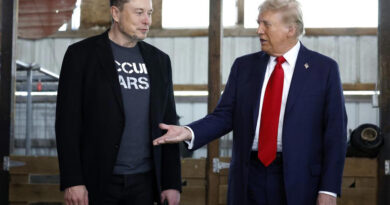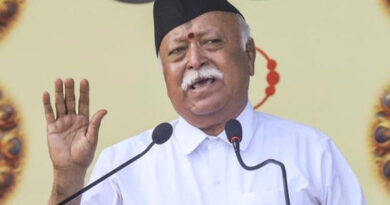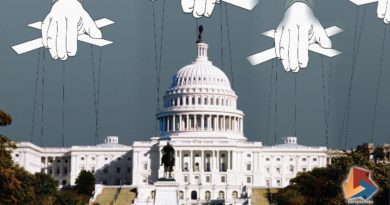Exclusive: Trump’s “Deep State” hit list

The Trump White House and its allies, over the past 18 months, assembled detailed lists of disloyal government officials to oust — and trusted pro-Trump people to replace them — according to more than a dozen sources familiar with the effort who spoke to Axios.
Driving the news: By the time President Trump instructed his 29-year-old former body man and new head of presidential personnel to rid his government of anti-Trump officials, he’d gathered reams of material to support his suspicions.
- While Trump’s distrust has only intensified since his impeachment and acquittal, he has long been on the hunt for “bad people” inside the White House and U.S. government, and fresh “pro-Trump” options. Outside advisers have been happy to oblige.
In reporting this story, I have been briefed on, or reviewed, memos and lists the president received since 2018 suggesting whom he should hire and fire. Most of these details have never been published.
- A well-connected network of conservative activists with close ties to Trump and top administration officials is quietly helping develop these “Never Trump”/pro-Trump lists, and some sent memos to Trump to shape his views, per sources with direct knowledge.
- Members of this network include Ginni Thomas, the wife of Supreme Court Justice Clarence Thomas, and Republican Senate staffer Barbara Ledeen.
The big picture: Since Trump’s Senate acquittal, aides say the president has crossed a psychological line regarding what he calls the “Deep State.” He feels his government — from Justice to State to Defense to Homeland Security — is filled with “snakes.” He wants them fired and replaced ASAP.
- “I think it’s a very positive development,” said Rich Higgins, who served on Trump’s National Security Council in 2017. H.R. McMaster removed Higgins after he wrote a memo speculating that Trump’s presidency faced threats from Marxists, the “Deep State,” so-called globalists, bankers, Islamists, and establishment Republicans. (This was long before the full scope of the FBI’s Russia investigation was known to Trump and his aides.)
- Higgins told me on Sunday he stands by everything he wrote in his memo, but “I would probably remove ‘bankers’ if I had to do it over and I would play up the intel community role — which I neglected.”
Let’s get to the memos.
1. The Jessie Liu memo: Shortly before withdrawing the nomination of the former D.C. U.S. attorney for a top Treasury role, the president reviewed a memo on Liu’s alleged misdeeds, according to a source with direct knowledge.
- Ledeen wrote the memo, and its findings left a striking impression on Trump, per sources with direct knowledge. Ledeen declined to comment.
- A source with direct knowledge of the memo’s contents said it contained 14 sections building a case for why Liu was unfit for the job for which Treasury Secretary Steven Mnuchin selected her, including:
- Not acting on criminal referrals of some of Justice Brett Kavanaugh’s accusers.
- Signing “the sentencing filing asking for jail time” for Gen. Michael Flynn (a friend of Ledeen’s).
- Holding a leadership role in a women’s lawyers networking group that Ledeen criticized as “pro-choice and anti-Alito.”
- Not indicting former deputy director of the FBI Andrew McCabe.
- Dismissing charges against “violent inauguration protesters who plotted to disrupt the inauguration.”
- Neither Liu nor the White House responded to requests for comment.
Between the lines: The Liu memo is not the first such memo to reach the president’s desk — and there’s a common thread in Groundswell, a conservative activist network that’s headed by Thomas and whose members include Ledeen.
- Sources leaked me details of two other memos from people associated with the Groundswell network that also caused a stir inside the White House over the past year.
Thomas has spent a significant amount of time and energy urging Trump administration officials to change the personnel inside his government. This came to a head early last year.
- Members of Groundswell, whose members earlier led the successful campaign to remove McMaster as national security adviser, meet on Wednesdays in the D.C. offices of Judicial Watch, a conservative legal group that has led the fight against the Mueller probe.
- Judicial Watch’s president is Tom Fitton. He’s a regular on Fox News, and Trump regularly retweets his commentary on the “Deep State.”
- Conservative activists who attend Groundswell meetings funneled names to Thomas, and she compiled those recommendations and passed them along to the president, according to a source close to her.
- She handed a memo of names directly to the president in early 2019. (The New York Times reported on her group’s meeting with Trump at the time.)
2. The Groundswell memo: The presidential personnel office reviewed Thomas’ memo and determined that some names she passed along for jobs were not appropriate candidates. Trump may revisit some given his current mood.
Potential hires she offered to Trump, per sources with direct knowledge:
- Sheriff David Clarke for a senior Homeland Security role.
- Fox News regular and former Secret Service agent Dan Bongino for a Homeland Security or counterterrorism adviser role.
- Devin Nunes aide Derek Harvey for the National Security Council (where he served before McMaster pushed him out).
- Radio talk show host Chris Plante for press secretary.
- Federalist contributor Ben Weingarten for the National Security Council.
What we’re hearing: These memos created tension inside the White House, as people close to the president constantly told him his own staff, especially those running personnel, were undermining him — and White House staff countered they were being smeared.
3. The State Department memo: In one extraordinary incident last year, President Trump passed along another action memo to his then-head of presidential personnel, Sean Doocey (since pushed to State and replaced with former body man John McEntee). People familiar with the January 2019 memo say it came from conservatives associated with Groundswell. Though nobody I’ve spoken to has claimed credit for it.
- According to sources briefed on the incident, the memo was, in large part, an attack against Doocey. The memo accused him and a colleague in the State Department of obstructionism and named several State Department officials who needed to be fired.
- This list named former deputy secretary John Sullivan, deputy undersecretary for management Bill Todd, and undersecretary for political affairs David Hale, who later testified in the impeachment hearings. (Todd and Hale are career foreign service officers, serving in positions typically reserved for career officials.) Sullivan is now the U.S. Ambassador to Russia.
- The memo ended with an allegation that Doocey had sneakily changed the name of an appointment Trump had already agreed on, swapping out Mira Ricardel for Sean Cairncross to run the Millennium Challenge Corporation.
- Sources briefed on the matter say this particular charge was false on its face because Cairncross was nominated in January 2018, months before Ricardel was briefly discussed as an alternative, per sources with direct knowledge.
The bottom line: As the New York Times’ Peter Baker wrote on Saturday, “in some of the most critical corners of the Trump administration, officials show up for work now never entirely sure who will be there by the end of the evening — themselves included.”
- Groundswell is an influential driver of that uncertainty. Its members have been working toward this moment for three years. They have lists. They have memos. And they have the president’s ear.


